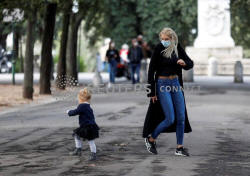 Lockdown
bambino bust: 9 months on, Italian births fall 22 percent Lockdown
bambino bust: 9 months on, Italian births fall 22 percent
 Send a link to a friend
Send a link to a friend
[February 05, 2021]
By Gavin Jones and Emma Thomasson
ROME/BERLIN (Reuters) - Maybe it was the
stress. Maybe it was being cooped up with the mother-in-law. But the
numbers are in, and one effect of the coronavirus lockdown is now clear:
people made fewer babies. A lot fewer babies.
|
|
 Births in Italy in December - exactly nine months after the country
went into Europe's first lockdown - plunged by a whopping 21.6%,
according to figures from a sample of 15 Italian cities released
this week by statistics agency ISTAT. Births in Italy in December - exactly nine months after the country
went into Europe's first lockdown - plunged by a whopping 21.6%,
according to figures from a sample of 15 Italian cities released
this week by statistics agency ISTAT.
And the impact is far from over. Marriages fell by more than half in
the first 10 months of last year, which ISTAT chief Gian Carlo
Blangiardo called "a further factor in a probable decline in births
in the immediate future".
Demographics experts have been predicting a baby bust across Europe
for 2021, as the impact of last year's lockdowns is felt.

A survey conducted in five European countries during the March and
April lockdown showed many people calling off plans to have kids.
Germans and French were more likely to say they were delaying, while
Italians were more likely to say they had abandoned their plans
altogether.
Last year, Britain recorded a plunge in imports of baby carriages
https://tmsnrt.rs/3cNiwsi, to the lowest level since records began
in 2000. (Yes, the Treasury counts imports of baby carriages. In
tonnes.)
While its data is not yet complete, the German statistics office
said 2020 was probably the first year since 2011 that the population
did not grow, both because of declining births and because COVID-19
meant fewer people immigrated.
[to top of second column] |
 Still, there are signs some
people who put off making babies in 2020 may be
getting down to business at last. Sales of
pregnancy tests and pregnancy vitamins in
Germany jumped in the last few months, according
to a poll conducted for pharmacy news service
Apotheke Adhoc.
"The bigger the economic fears, the bigger the
impact on the birth rate," said Martin Bujard,
deputy director at Germany's Federal Institute
for Population Research. "So in countries where
the welfare state minimises the economic impact
- like Germany - there might be less of a
negative effect."
(Graphic: UK baby carriage imports fall to
record low in 2020 -
https://fingfx.thomsonreuters.com/
gfx/polling/dgkplknbgvb/Pasted%20image%201612434912647.png)
(Additional reporting by Reuters reporters in
European bureaux; Editing by Mark John and Peter
Graff)
[© 2021 Thomson Reuters. All rights
reserved.] Copyright 2021 Reuters. All rights reserved. This material may not be published,
broadcast, rewritten or redistributed.
Thompson Reuters is solely responsible for this content
 |